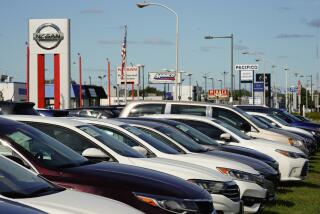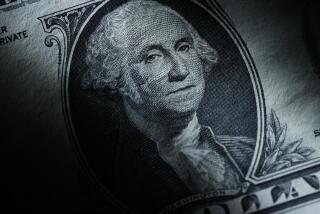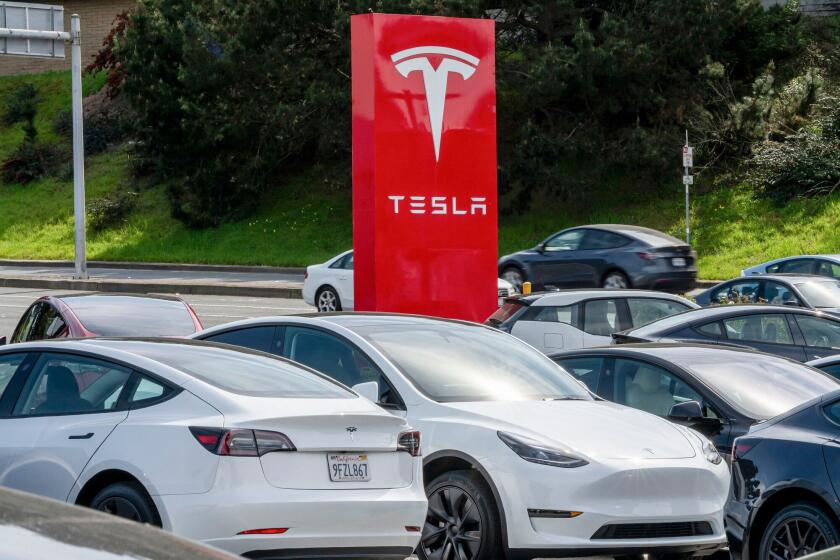Interest Rates on U.S. Savings Bonds Fuel Soaring Sales
- Share via
Investors looking for safety and attractive returns have rediscovered one of the dullest investments around: U.S. savings bonds.
Sales of savings bonds are soaring, and indications are that sales will exceed the $12.4-billion record set in 1944. By the end of August, investors had already poured $11.5 billion into the bonds during fiscal 1992, which ends at the end of this month, according to the Federal Reserve. In August alone, individuals invested $1.5 billion, the most sold in that month since World War II.
Why all the interest? Savings bonds now pay a rate of 4.16% for the first six months, a rate greater than what investors now earn on six-month Treasury bills. The rate gradually will rise to at least 6% for people who hold the bonds for five years or longer. That compares to the 5.25% investors now get on five-year Treasury notes.
Even so, savings bonds are not best for everyone. Interest payments are deferred until the bonds are cashed in, so they are not suitable for people who want regular interest payments. And the government limits annual investment in savings bonds to $15,000.
CARTING BACK THE CARTS: For years, the California Grocers Assn. has struggled with the delicate problem of how to get homeless people to return shopping carts. “You can’t just go in and take them,” association President Don Beaver says. “People accuse us of taking homes from the homeless.”
Beaver says grocers have tried to enlist help from police to retrieve carts, to no avail. So starting next month, the supermarket trade group will try a different tack: Grocers will donate old or slightly damaged shopping carts to homeless people in the Los Angeles area, who will then be asked to trade-in newer models.
Grocers will paint the old carts bright orange, and bring them to soup kitchens and--as Beaver puts it--”places where homeless go to feed.” Apparently, the grocers think the homeless will want to trade down.
BUY AMERICAN: Companies that launched “Buy American” programs last winter say rebates offered to employees who bought American-made cars helped boost sales of those cars, though results vary.
At Monsanto Chemical Corp., nine out of every 10 employees who took advantage of the rebate program chose General Motors, Ford and Chrysler models over American-made foreign cars. One reason why: The Big Three matched Monsanto’s generous $1,000 rebate. Foreign auto makers did not.
Monsanto Chemical says that 28% of its employees participated, twice the number expected and more than at other firms. Tosco Corp. of Stamford, Conn., for example, says just 3.5% of its employees participated in its program. Auto makers didn’t match Tosco’s $1,000 rebate.
Though they say they are pleased with the programs, few employers intend to make rebates a permanent part of their employee benefits package. “We did this to help our customers,” says a spokesman for Monsanto Chemical, a supplier of adhesives and specialty chemicals to the auto industry. “We think we accomplished that.”
RECESSION RIPOFFS: Complaints about seminars on real estate investing or credit repair swelled nearly six-fold last year, the Better Business Bureau reports, making them one of the the fastest-growing consumer problems.
Dianne Ward, a bureau spokeswoman, says people who attend some of the free seminars often end up spending hundreds of dollars for tapes and cassettes that offer worthless advice.
Ward says the recession is apparently driving people to these seminars, which seem to offer an easy path to financial improvement.
Other fast-growing sources of consumer complaints last year were loan brokers, appliance stores and rebate offers.
Looking ahead, Ward believes that job placement scams will rank high on the 1992 list. In scams that the bureau is aware of, consumers pay so-called job advisory services $25 or more for job lists derived from old classified newspaper ads. Very often, the lists are so old that the jobs are no longer available, Ward says.
More to Read
Inside the business of entertainment
The Wide Shot brings you news, analysis and insights on everything from streaming wars to production — and what it all means for the future.
You may occasionally receive promotional content from the Los Angeles Times.










